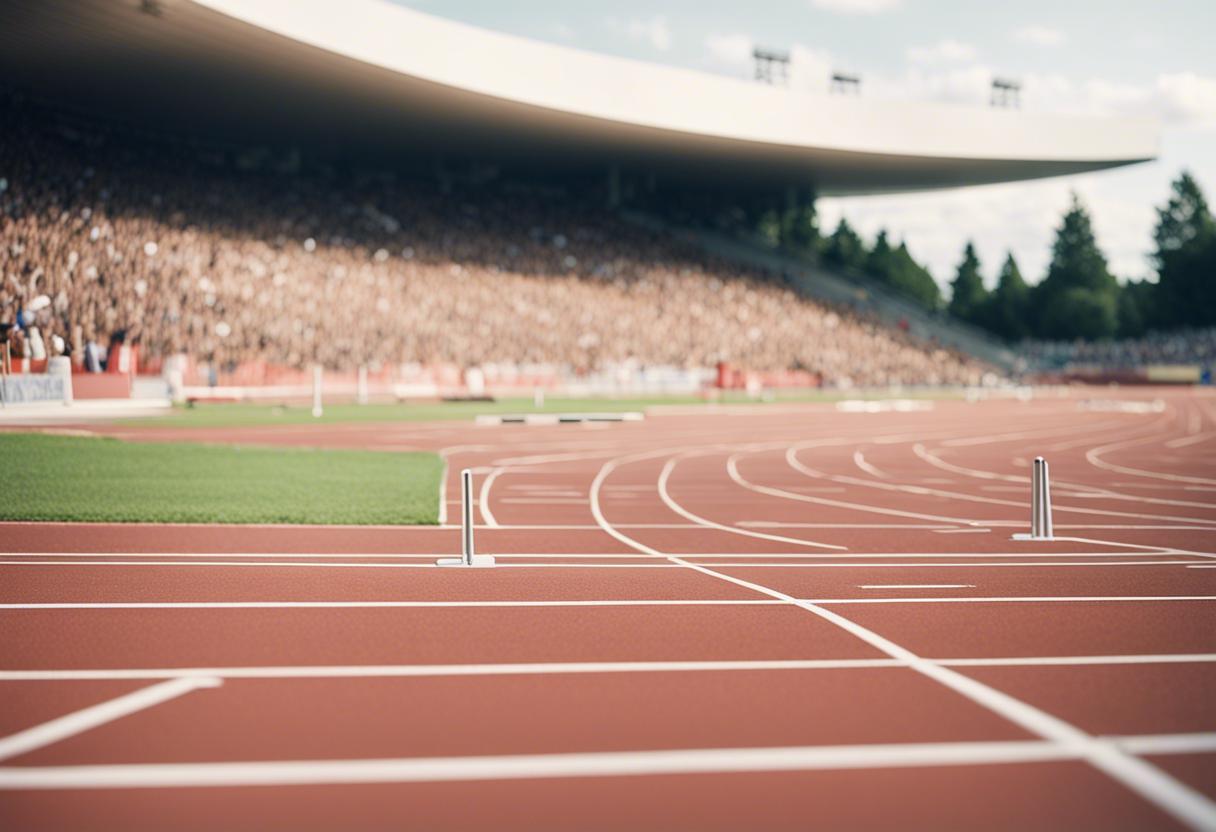In late January 2022, Israel Olatunde, a youthful rising star in Irish athletics, sat outside the UCD Sports Centre and gave his thoughts on the possibility of breaking the long-held Irish 100 metres record that stood firmly at 10.18 seconds, a record set in stone back in 2007 by Paul Hession. Despite being merely 19 years old, Olatunde had already claimed his maiden Irish senior 100m title the past summer with a commendable personal best time of 10.41 seconds. Hession’s record, untouched for almost a decade and a half, and his remarkable achievements in the 60m, 100m, and 200m were respected by Olatunde. However, the aspiring sprinter believed in the evolving nature of records and was determined to push his limits.
Just half a year on, Olatunde had successfully engraved his name as Ireland’s fastest sprinter, felling Hession’s record by a sliver. His time of 10.17 seconds in the European Championships 100m final in Munich in August 2022 put him in the sixth spot, but more importantly, marked him as Ireland’s fastest man. At the tender age of 20, the sprinter from Drogheda was already rubbing shoulders with the world’s elites, including Italy’s then- reigning Olympic champion Marcell Jacobs.
According to records released by Athletics Ireland, the first recognition of the country’s fastest sprinter was the 100 yards record of 10-and-a-half seconds set in May 1867 by William Armstrong at the Trinity College Park College Races.
Since the introduction of fully automatic timing in the sport occurred in 1971, there were only seven distinct men who had managed to achieve a new Irish 100 metres record before Olatunde’s entry. This began with the 10.85 seconds achievement by Vinny Becker in London back in the July of 1971.
Derek O’Connor, a sprinter hailing from Dublin, managed to break this record not once, but twice, achieving 10.61 seconds in 1983 and then surpassing his previous victory with a 10.58 seconds record in 1985. Gary and Neil Ryan, brothers from Tipperary, added to the record five instances between them. In 2004, Gary matched the record when he sprinted 10.35, reaching the same score as Paul Brizzel did back in June 2000.
In August 2022, Olatunde surpassed Hession’s record. Initially seeming primed for continuous improvement, his progression commenced the 2023 season with a winning start when he topped the Irish 60m indoor record – a landmark that Hession maintained since 2007. However, his growth leveled off.
In the previous season, his highest speed remained at 10.32, which lacked the required speed for the 2023 World Championships. In May, Olatunde acknowledged the emotional and mental challenges that come after reaching such extraordinary levels. He commented on the inevitability of the career trajectory not being consistently uphill, highlighting the importance of resilience and perseverance until success is achieved.
He embarked on the season with exhaustive training in Clermont, Florida alongside his coach Daniel Kilgallon and five added members of the sprint group at Tallaght AC. Despite missing out on the final at the 2024 European Championships in Rome and scoring lower than his best with a time of 10.40 seconds, there were encouraging indications of his previous form from 2022 previously. He clinched his fourth consecutive Irish 100m title in July with a score of 10.27 seconds.
This victory was closely followed by his former training partner and close friend from Tallaght AC, Rhasidat Adeleke. She too won an additional Irish 100m title and enhanced the women’s record to reach 11.13 seconds.
In spite of missing the Paris Olympics due to his time of 10 seconds not being quick enough for automatic qualification, Olatunde strode triumphantly back onto the track at a relatively understated sprinting event in Newham, London, on a Sunday afternoon. He claimed victory with a time of 10.12 seconds, shaving 0.05 off his previous best.
Suddenly, at the young age of 22, the once seemingly inaccessible 10-second threshold doesn’t appear as unnavigable as before.
“Absolutely, I envisage myself crossing that 10 second milestone one day,” he uttered optimistically on a January morning in 2022. He added, “The quicker your pace, the more challenging it is to further refine your time. However, if I continue to focus on what’s necessary, I believe I can reach it.”
Ireland has had a string of fast men since the introduction of fully automatic timing. Here are the progressions of some of the fastest runners:
– 10.85 seconds by Vinny Becker, London, July 1971
– 10.78 seconds by Colman O’Flaherty, Trostberg, Germany, September 1977
– 10.74 seconds by Colman O’Flaherty, Dublin, July 1978
– 10.61 seconds by Derek O’Connor, Cork, July 1983
– 10.58 seconds by Derek O’Connor, Trinidad, April 1985
– 10.56 seconds by Gary Ryan, Slovenia, May 1996
– 10.54 seconds by Gary Ryan, Latvia, June 1996
– 10.48 seconds by Gary Ryan, Cork, June 1996
– 10.46 seconds by Neil Ryan, Latvia, May 1997
– 10.45 seconds by Gary Ryan, Dublin, July 1999
– 10.35 seconds by Paul Brizzel, Estonia, June 2000
– 10.35 seconds by Gary Ryan, Cork, July 2004
– 10.28 seconds by Paul Hession, Greece, June 2007
– 10.18 seconds by Paul Hession, Finland, June 2007
– 10.17 seconds by Israel Olatunde, Germany, August 2022
– 10.12 seconds by Israel Olatunde, London, August 2024.

